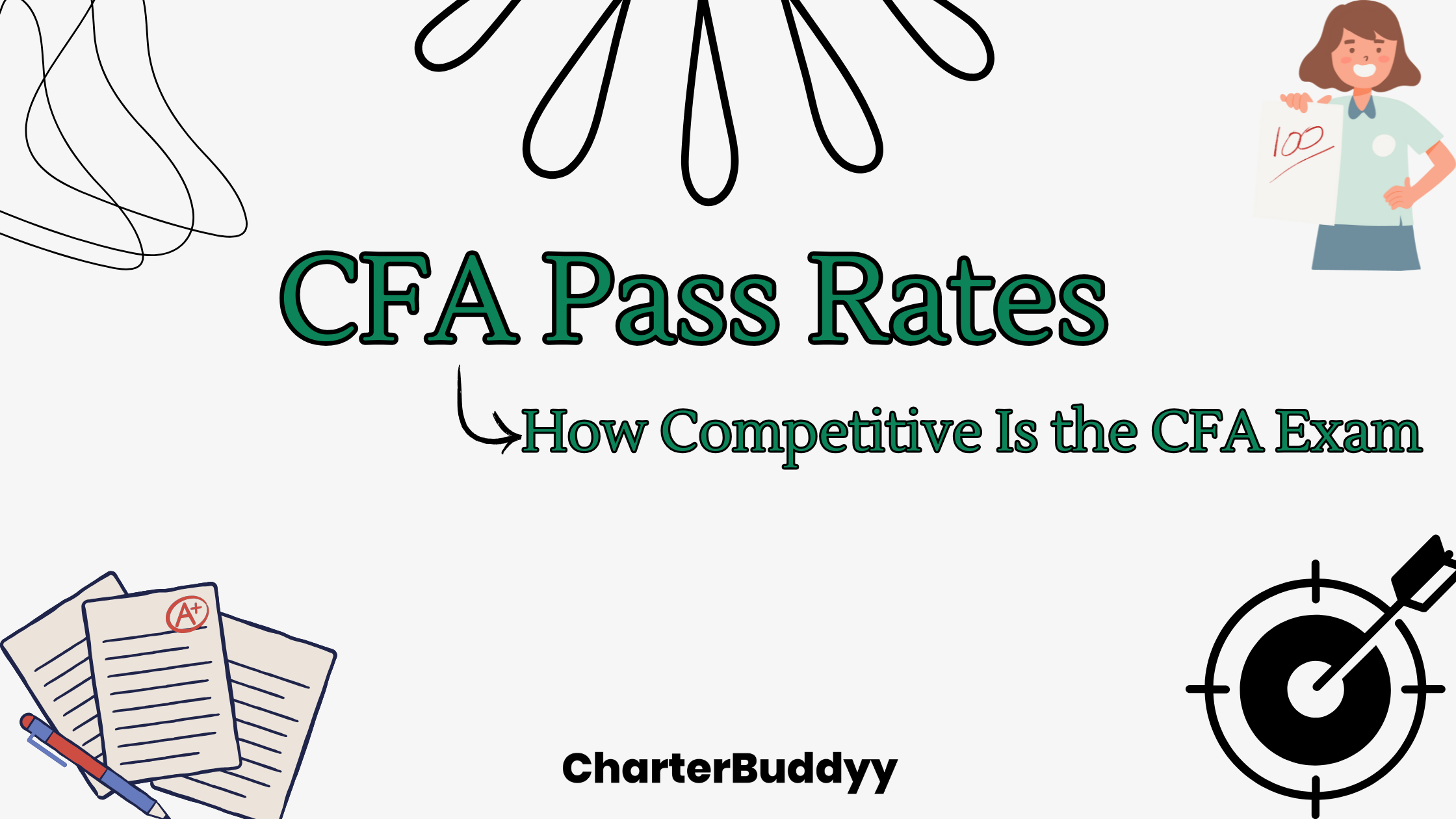CFA Pass Rates: How Competitive Is the CFA Exam
Home » CFA Pass Rates: How Competitive Is the CFA Exam

The Chartered Financial Analyst (CFA) exam is widely regarded as one of the most difficult and competitive exams in the finance world. As a rigorous 3-level program, the CFA exam requires an immense amount of preparation, discipline, and dedication.
One of the key factors that make the CFA exams so challenging is the pass rate, which has historically been quite low, especially for Level I.
In this blog post, we'll explore the CFA pass rates and compare them with other financial certification exams like the Financial Risk Manager (FRM), Certified Financial Planner (CFP), Certified Public Accountant (CPA), and even the GMAT. By the end, you'll have a better understanding of how competitive the CFA exam is and how it stacks up against other professional exams in finance.
What Are the CFA Pass Rates?
The CFA exams are divided into three levels, each becoming progressively more challenging:
Level I: Focuses on basic knowledge of finance and investment tools. Level II: Emphasizes asset valuation, financial analysis, and complex investment strategies. Level III: Focuses on portfolio management, asset allocation, and wealth planning.
The pass rates for these levels have historically been low, reflecting the challenging nature of the exam.
Here are the average CFA pass rates over the last few years:
| CFA Exam Level | 2024 Pass Rate | 2023 Pass Rate | 2022 Pass Rate | 2021 Pass Rate |
|---|---|---|---|---|
| Level I | 44% | 37% | 36% | 25% (record low) |
| Level II | 48% | 44% | 40% | 29% |
| Level III | 49% | 48% | 49% | 42% |
As you can see, the pass rates have fluctuated, with a sharp decline in 2021, particularly for Level I, where the pass rate hit a historic low of 25%.
While rates have rebounded slightly in recent years, they remain competitive and challenging, making the CFA exam one of the toughest in finance.
CFA vs Other Financial Certifications: How Does the CFA Exam Compare?
To understand just how competitive the CFA exam is, let’s compare its pass rates with other well-known financial certifications and exams.-
CFA vs FRM
- FRM Part I: Around 45-50%
- FRM Part II: Around 55-60%
-
CFA vs CFP
-
CFA vs CPA
-
CFA vs GMAT
- GMAT Average Score: Around 565-600 (out of 800)
- GMAT 90th Percentile: Around 700+
The FRM (Financial Risk Manager) certification is a highly respected credential for risk management professionals. Like the CFA, the FRM exam is split into two parts, and its pass rates offer a glimpse into its difficulty:
FRM Pass Rates
FRM Part II: Around 55-60% While FRM pass rates are higher than CFA pass rates, they still reflect the rigor and practice required to pass. The FRM exam, though challenging, tends to have slightly higher pass rates due to its narrower focus on risk management compared to the broader financial curriculum of the CFA.
The Certified Financial Planner exam is tailored for financial advisors and planners, covering financial planning, taxes, insurance, estate planning, and retirement planning. Here are the typical pass rates for the CFP exam:
CFP Pass Rate: 62-65%
The CFP exam is easier to pass than the CFA, with higher pass rates. While the CFP exam is rigorous in its own right, it doesn’t delve as deeply into complex financial concepts such as equity analysis and portfolio management.
The CPA (Certified Public Accountant) exam is often compared to the CFA because both are seen as standards in their respective fields. The CPA exam consists of four sections, and candidates must pass all four within 18 months. Here are the average pass rates for the CPA exam:
CPA Pass Rate (Overall): 50-55%
While the CPA exam is also challenging, its pass rates tend to be higher than the CFA, likely because it tests a broader set of accounting and auditing principles, which may be more familiar to candidates with accounting backgrounds.
The GMAT (Graduate Management Admission Test) is commonly taken by candidates seeking admission to top business schools worldwide. Unlike the CFA, which is a certification for finance professionals, the GMAT is an entrance exam for MBA programs. Here’s how the pass rates compare:
GMAT Average Score & Percentile
While the GMAT does not have a direct pass/fail system like the CFA, scoring above 700 places candidates in the top 10% of test takers. The difficulty level varies depending on a candidate’s target school, but the structured nature of the GMAT makes it relatively easier to prepare for compared to the CFA's vast curriculum.
Why Are CFA Pass Rates So Low?
The low pass rates for the CFA exams can be attributed to several factors:-
Breadth of Topics
-
Depth of Knowledge
-
Time Commitment
-
Strict Grading
The CFA curriculum covers a wide range of finance subjects, including economics, portfolio management, financial analysis, and ethics. Candidates need a strong grasp of all areas to pass.
Each level of the CFA exam goes deeper into financial concepts. For example, Level II focuses heavily on asset valuation and requires a deep understanding of financial reporting, while Level III emphasizes advanced portfolio management.
According to the CFA Institute, candidates typically spend over 300 hours preparing for each level. Balancing this commitment with work or other responsibilities can be challenging, contributing to lower pass rates.
The CFA Institute uses a rigorous grading process. To pass, candidates must achieve a score above the Minimum Passing Score (MPS), which varies depending on the difficulty of the exam.
How to Prepare for the CFA Exam
Given the competitive nature of the CFA exam and its low pass rates, here are a few tips to help you succeed:-
Start Early
-
Use Multiple Study Resources
-
Take Practice Exams
-
Join Study Groups
The CFA exam requires significant preparation time. Aim to start studying at least 6 months before the exam.
Don’t rely on one study method. Use the CFA curriculum, practice questions, mock exams, and supplementary study materials to gain a thorough understanding of the topics.
Simulate the actual exam experience by taking practice exams under timed conditions. This will help you manage your time effectively on exam day.
Engage with other candidates and join study groups to share insights, resources, and motivation.
For more information on how to prepare for the CFA exams, check out our blog
Conclusion: CFA vs Other Exams
When compared to other financial certifications like FRM, CFP, CPA, and even GMAT, the CFA exam stands out for its difficulty and competitiveness, reflected in its lower pass rates. However, this also makes it a prestigious and highly respected qualification in the finance world. The rigorous nature of the exam and the breadth of topics covered means that passing the CFA demonstrates an exceptional level of knowledge and commitment.
If you’re planning to take the CFA exam, understanding its difficulty and the preparation required is the first step to success. While the CFA pass rates are lower than some other exams, with the right preparation strategy, you can join the ranks of successful CFA charterholders and boost your finance career to new heights.
Feel free to explore more of our blogs on Charterbuddyy to get detailed tips on CFA exam preparation and insights into other finance-related certifications!
Table of Contents
- What Are the CFA Pass Rates?
- CFA vs Other Financial Certifications: How Does the CFA Exam Compare?
- Why Are CFA Pass Rates So Low?
- How to Prepare for the CFA Exam
- Conclusion: CFA vs Other Exams


What are pass rates?